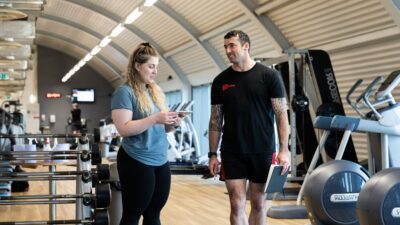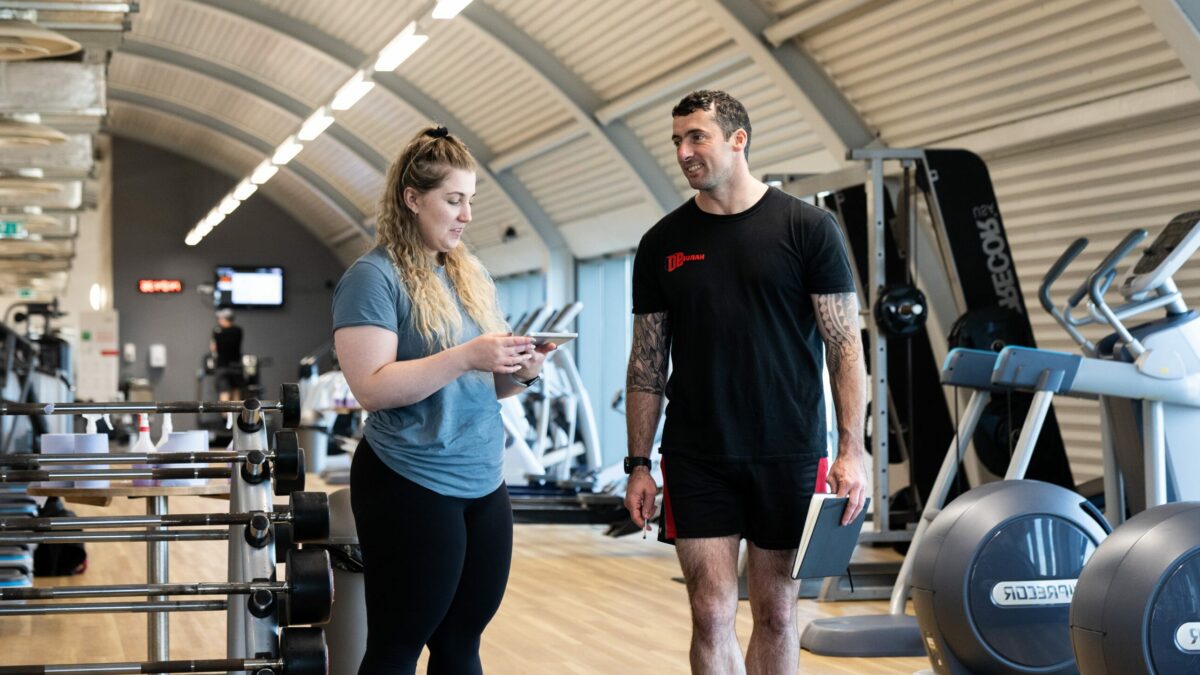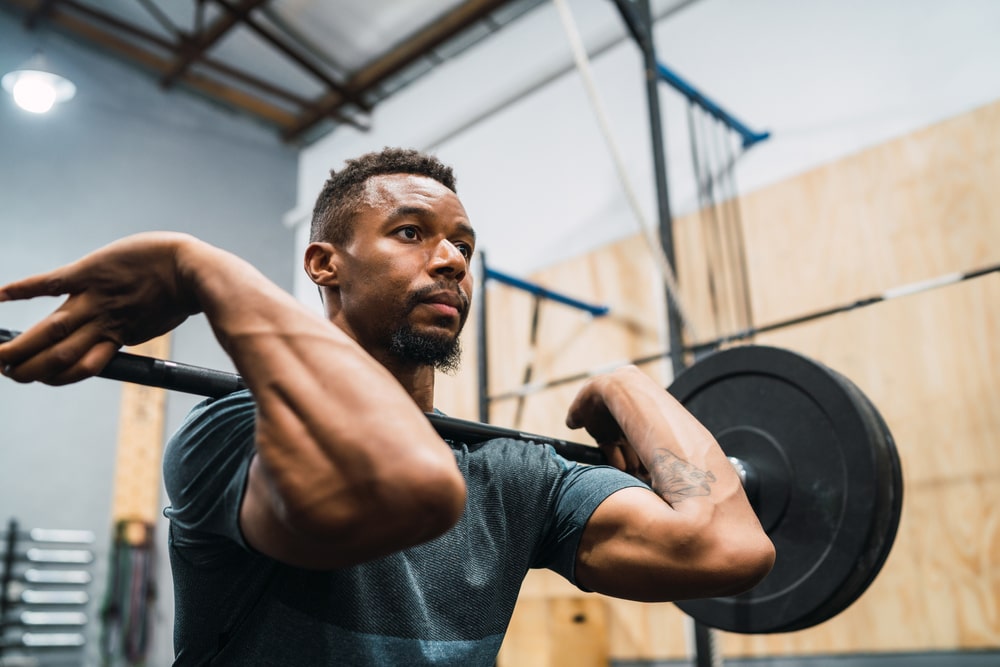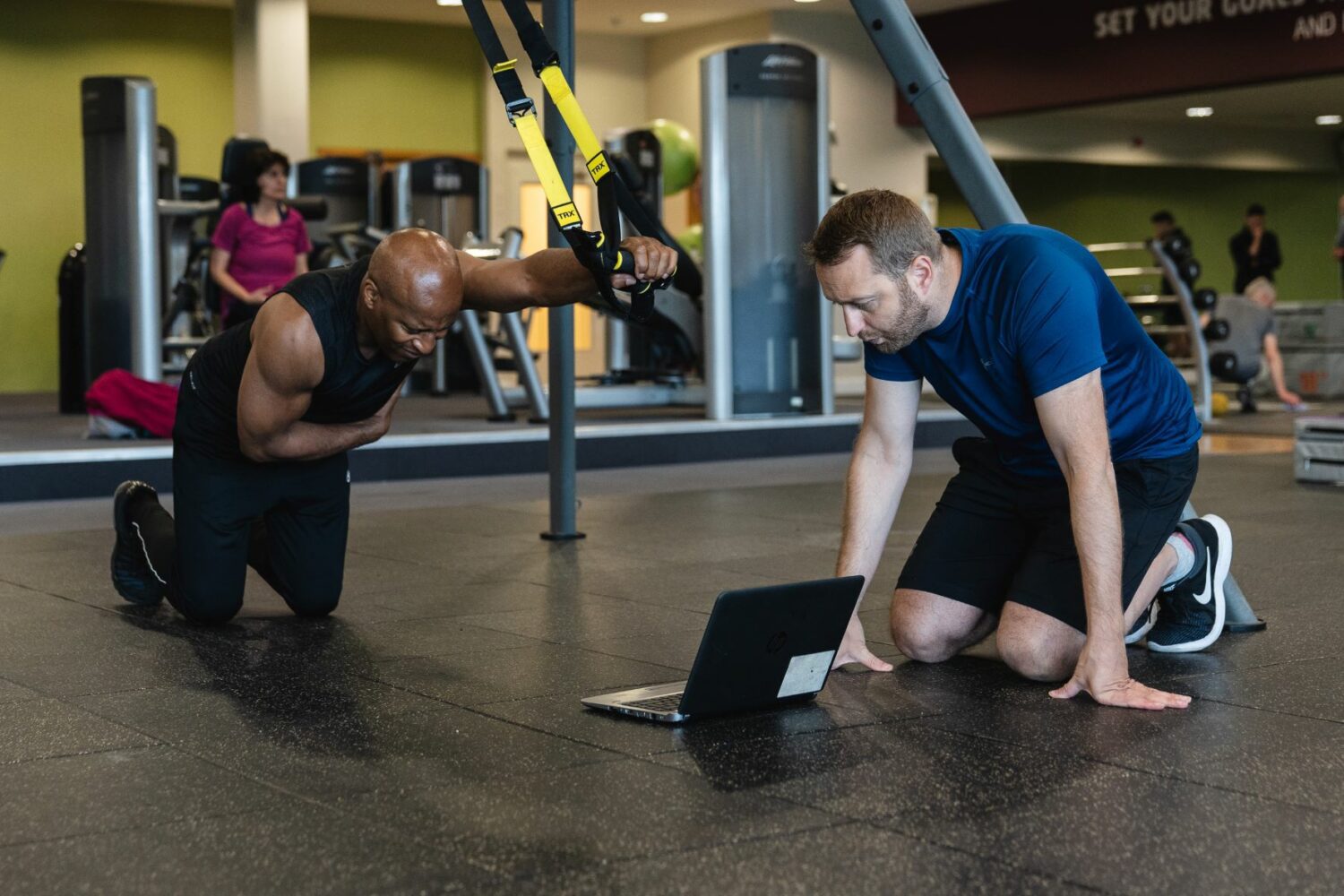



Personal trainers guide individuals towards achieving health and fitness goals. By using a range of training techniques, these professionals tailor workouts to accommodate each client’s unique capabilities and objectives. From high-intensity interval training promoting cardiovascular health to resistance exercises crafted for strength building, trainers use their expertise to design effective programs.
Let’s have a look at the diversity of personal trainer styles as you seek a path towards your fitness aspirations.

Strength and conditioning coaches propel athletes towards peak physical performance while diligently working to minimize the risk of injury. These professionals apply scientific knowledge to train athletes for the primary goal of improving athletic performance. Their training regimens are meticulously tailored to enhance key attributes such as strength, speed, endurance, and agility.
Distinct from fitness trainers catering to the general population, strength and conditioning coaches often collaborate with competitive athletes. Programs are designed with the specific demands of the athlete’s sport in mind, requiring a detailed understanding of the sport’s unique physiological and biomechanical requirements.
Through rigorous training programs that go beyond general fitness routines, athletes are equipped not just to compete, but to excel. Schooling athletes in proper techniques and offering timely feedback, these coaches ensure that each movement and workout contributes to the athlete’s overarching goals.
These professionals dissect each component of an athletic discipline to devise programs that elevate performance to elite levels.
When athletes engage with specialized sports trainers, they immerse in a regimen constructed to sharpen their sport-specific abilities. Acceleration, endurance, or precision; every facet gets honed with meticulous planning.
For instance, a sprinter will focus intensely on explosive starts and speed maintenance, while a soccer player’s program underscores agility, ball control, and sustained cardiovascular endurance. Tailoring Programs for Athletes’ Unique Needs
Specialised sports trainers must understand an athlete’s physiological and psychological nuances. They employ assessment tools to capture an athlete’s strengths and weaknesses, which aids in crafting a uniquely tailored training schedule.
A bespoke program may include periodization, rest cycles, and nutritional advice, ensuring the athlete is primed for peak performance at critical times. By considering variables such as an athlete’s injury history or career stage, trainers adapt workouts to optimize the athlete’s growth potential without compromising their well-being.

Rehabilitation and Physical Therapy Trainers focus on aiding individuals on their journey to recovery after sustaining injuries. The expertise of these professionals lies in designing and implementing exercise programs that address specific impairments, promote healing, and prevent future injuries. With precision, these trainers craft routines that gradually rebuild the strength, flexibility, and endurance necessary for day-to-everyday function, aligning their methodology with the benchmarks of recovery.
These trainers frequently collaborate with a network of healthcare providers, ensuring a holistic approach to rehabilitation. Through collaborative efforts, their tailored regimens reflect current medical insights, providing a complementary bridge between clinical therapy and independent physical activity.

Steering away from solely focusing on physical exercise, Wellness Coaches work with health, embedding fitness within the tapestry of overall well-being.
A Wellness Coach seeks harmony in body, mind, and spirit, crafting personalized plans that endorse healthy habits and positive lifestyle changes.
Wellness coaching transcends the gym environment. These professionals often collaborate with clients in varied settings, be it corporate wellness programs, private practices, or virtual platforms. They offer tools and support to help clients navigate life’s complexities with resilience and vitality.
Clinical Exercise Physiologists specialize in creating tailored exercise regimens for individuals grappling with chronic health conditions. Their work environment often extends to hospitals, rehabilitation facilities, and clinics where they collaborate closely with healthcare professionals. They bring a unique blend of kinesiology knowledge and clinical expertise, facilitating improved patient outcomes through exercise.
Patients with heart disease, diabetes, pulmonary disorders, and other long-standing health issues benefit significantly from the interventions of Clinical Exercise Physiologists. By analyzing medical histories and conducting fitness assessments, these professionals develop personalized exercise programs that address specific health challenges. Regular, guided physical activity as prescribed by Clinical Exercise Physiologists has been shown to mitigate symptoms and enhance the quality of life.
Dedicated to the science of body composition, these trainers possess a deep understanding of how different exercises provoke specific hormonal responses that are conducive to fat loss. Armed with this knowledge, they design workouts that optimize energy expenditure and enhance metabolic rate.
Simultaneously, a comprehensive approach is adopted by these specialists. They provide insights into healthy eating patterns, portion control, and dietary choices that align with their client’s weight loss goals. Understanding that exercise is only part of the equation, these experts emphasize a holistic approach, ensuring sustainable results by addressing lifestyle factors that contribute to weight gain.
Beyond the gym, these specialists often encourage clients to engage in behaviour modification strategies. These can include accountability tactics like food diary maintenance and setting achievable, incremental goals, which play a crucial role in a successful weight loss journey.

Group Exercise Instructors lead participants through invigorating classes, tailoring workouts that participants simultaneously follow. These professionals craft dynamic sequences that not only elevate heart rates but also ensure accessibility for varying skill levels. By fostering an inclusive atmosphere, they enable each member to thrive, irrespective of individual fitness levels.
The design of each class reflects an intricate balance of challenge and enjoyment. Instructors incorporate a medley of cardiovascular drills, strength exercises, and flexibility movements. These elements converge to form a symphony of physical exertion, unlocking the doors for wider participation and steady progress.
One size does not fit all in the realm of group exercise. Instructors seamlessly adjust their teaching methods to suit the group’s spectrum of abilities. Through modifications and scalable intensity options, these trainers guarantee that every participant finds the sweet spot between comfort and personal growth.
Beyond physical training, Group Exercise Instructors are architects of camaraderie. They establish a platform where encouragement abounds and collective goals are pursued with vigor. Class attendees draw inspiration from shared experiences, driving consistent attendance and fostering a motivational ecosystem that celebrates each success.
Athletic trainers wield a specialized knowledge that is paramount for preparing athletes for optimal performance. Their expertise lies not only in devising rigorous strength training and conditioning programs but also in the important domain of injury prevention. Unlike other personal trainer types, athletic trainers often collaborate closely with medical professionals to offer on-field immediate care.
With their professional focus, athletic trainers develop programs tailored to an athlete’s specific needs, sport, and performance goals. These programs typically integrate evidence-based practices to ensure maximum performance enhancement and reduced injury risk.
The role of athletic trainers extends beyond the gym or the training room. They frequently operate in dynamic environments—on sports fields, courts, and tracks—where quick thinking and rapid response to injuries are as critical as the conditioning programs they create.
Athletic trainers guide athletes through exercises that build strength, endurance, agility, and speed. Moreover, they educate athletes on proper techniques and strategies to help prevent future injuries. This proactive approach is designed to promote an athlete’s health and longevity in their chosen sport.
A trusted athletic trainer becomes an indispensable part of an athlete’s career, significantly impacting their ability to perform and compete at their best. The applied sciences of kinesiology, biomechanics, and nutrition, woven into their practice, make athletic trainers essential for any competitive sports program.

With a spotlight on enhancing performance in daily activities, Functional Training Experts tailor exercise routines that foster balance, stability, and mobility. They guide clients through movements designed to fortify the body against the physical strains of everyday life.
By simulating common actions such as lifting, reaching, and squatting, these experts strengthen muscle groups in unison rather than isolation. As a result, their clients enjoy a reduced risk of injury and an increased capacity to perform tasks with ease and efficiency.

Tranquil environments and focused practices are typical scenes where Yoga and Pilates instructors impart their knowledge. Guiding participants through methodical movements, these instructors concentrate on the symbiotic relationship between mind and body. Breath control, concentration, and smooth transitions constitute a session’s foundation, leading to enhanced mental clarity and physical agility.
Clients who participate in Yoga and Pilates often report a profound synergy between mental focus and physical prowess. By incorporating mindfulness, instructors facilitate a practice that reduces stress and increases proprioception – the awareness of the body’s position and movement in space. Chronic ailments related to stress and posture see significant improvement, and practitioners can expect an overall uplift in their quality of life. The calm and disciplined approach of these instructors contributes to a holistic wellness regimen that transcends typical physical exercise boundaries.
Bodybuilding and physique coaches specialize in sculpting the body for aesthetic purposes. Their expertise allows them to design tailored programs aimed at building muscle mass and enhancing muscular definition. These coaches provide a unique blend of nutritional guidance, resistance training routines, and competitive preparation strategies to assist clients in achieving their maximum potential in physical appearance.
These trainers ensure that each exercise in a client’s regimen contributes to the overall goal of pronounced musculature. Progressive overload, isolation exercises, and compound movements are commonly incorporated into fitness plans. By focusing on meticulous form and targeted muscle groups, these coaches strive to optimize physical transformations.

Fitness regimens adapt as individuals age; thus, Senior Fitness Trainers specialize in creating and implementing exercise plans tailored to the older population. These certified professionals understand age-related physiological changes and their implications on physical activity. They often hold additional certifications in senior fitness, such as the Senior Fitness Specialist certification from the American Council on Exercise.
Engaging in regular physical activity with a Senior Fitness Trainer enhances flexibility, strength, and stamina. Trainers focus on exercises that maintain or improve postural stability and reduce the risk of falls, which can lead to significant injuries. Resistance training, for example, is incorporated to fortify bone density and muscle mass, both of which naturally diminish with age.
Senior Fitness Trainers also act as a motivator and educator, helping clients understand the benefits of staying active, such as managing blood pressure and reducing the risk of heart disease, diabetes, and osteoporosis. With a focus on holistic well-being, trainers provide a service far beyond physical training; they contribute significantly to the overall health and longevity of their clients.

Digital platforms have revolutionized how personal trainers deliver their services. Online personal trainers offer custom workout plans, nutrition guidance, and personalized support, making it convenient to train anytime, anywhere. With advanced technology, these trainers track progress, modify routines, and ensure clients perform exercises correctly through video demonstrations and live sessions.
Through fitness mobile apps and virtual training systems, clients access their personalized programs with ease, enabling them to integrate fitness effectively into their daily routines.
Custom mobile app development allows these trainers to offer even more personalized and flexible solutions tailored to individual client needs
Online personal trainers stand out for their ability to provide flexibility, appealing to those who have busy schedules or prefer the privacy of their own space for workouts.
Despite the absence of a physical presence, online personal trainers excel in keeping their clients motivated. Regular check-ins, real-time feedback, and interactive challenges are just some of the strategies used. They establish accountability mechanisms, encouraging clients to set goals and strive consistently, thus driving them towards their desired fitness outcomes.
Clients exploring online personal training must consider the qualifications of their potential personal trainers. Certifications from reputable organizations ascertain that an online personal trainer has the necessary expertise to design and supervise exercise programs safely and effectively. Detailed profiles and reviews can offer insights into a trainer’s specialization and client satisfaction levels.
Diverse goals and fitness levels necessitate different expertise from personal trainers. With specializations ranging from weight loss to sports performance, and rehabilitation to wellness, each trainer brings a unique skill set designed to meet individual needs.
Deciding on the right personal trainer involves assessing your objectives and preferred training style. Searching for a boost in physical strength? A Strength and Conditioning Coach could be your guide.
Confronting a sports injury? Rehabilitation and Physical Therapy Trainers are equipped to facilitate your recovery. Perhaps achieving balance and core strength is your aim, Yoga and Pilates Instructors are professionals in this discipline.
Each trainer type embodies a distinct approach, catering to various aspects of fitness and well-being.